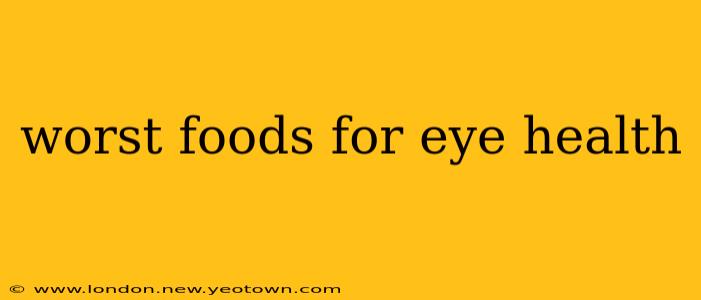We all know that eating a balanced diet is crucial for overall health, but did you know that certain foods can actually harm your eyesight? While a single donut won't suddenly blind you, consistently consuming foods high in certain components can negatively impact your eye health over time. This isn't about demonizing delicious treats, but about making informed choices for long-term vision wellness. Let's explore some of the culinary culprits that could be sabotaging your sight.
What Foods Are Bad for Your Eyes?
This isn't a simple list of "good" and "bad" foods; it's about understanding the impact of excess consumption of certain nutrients and components. Let’s dive in!
1. Highly Processed Foods: The Silent Saboteurs
Think sugary cereals, packaged snacks, fast food – the usual suspects. These are often loaded with unhealthy fats, sugars, and sodium, and remarkably low in essential nutrients. These nutritional voids can contribute to inflammation throughout the body, including the eyes. Chronic inflammation is linked to various eye conditions, such as age-related macular degeneration (AMD) and cataracts. The lack of essential vitamins and antioxidants further weakens the eye's defense mechanisms.
2. Foods High in Trans Fats: A Recipe for Disaster
Trans fats, found in many processed foods and fried items, are notorious for wreaking havoc on cardiovascular health. This damage extends to the eyes as well. Trans fats contribute to inflammation and can disrupt the delicate blood supply to the retina, potentially accelerating the progression of age-related eye diseases. Choosing healthier cooking methods and opting for foods with minimal or no trans fats is crucial.
3. Excessive Sugar: A Sweet Threat to Vision
While the occasional treat is fine, excessive sugar consumption can contribute to oxidative stress and inflammation, both of which are damaging to eye health. High blood sugar levels, a consequence of excessive sugar intake, are also associated with an increased risk of cataracts and diabetic retinopathy—a leading cause of blindness in adults.
4. Refined Carbohydrates: The Sneaky Culprits
White bread, pastries, and white rice are all examples of refined carbohydrates—foods that have been stripped of their fiber and nutrients. These rapidly increase blood sugar levels, leading to the same negative effects as excessive sugar consumption. Prioritize whole grains, fruits, and vegetables for sustained energy and better eye health.
5. Alcohol: Moderation is Key
Excessive alcohol consumption is linked to several health problems, including eye damage. Alcohol can increase intraocular pressure, potentially contributing to glaucoma. Moderate consumption, if any, is advisable.
What About Specific Nutrients? Are Some More Harmful Than Others?
While the foods themselves are problematic, the excess of certain nutrients within them is what contributes to poor eye health. For example, excessive sodium leads to water retention, which can increase pressure within the eye. An excess of saturated fats can contribute to inflammation. It’s not about avoiding these nutrients entirely, but maintaining a balance.
How Can I Protect My Eyes Through Diet?
The good news is, you can actively protect your eyes through dietary choices! Focus on a diet rich in:
- Antioxidants: Found in colorful fruits and vegetables, these combat oxidative stress.
- Omega-3 fatty acids: Crucial for reducing inflammation and maintaining retinal health. Found in fatty fish and flaxseeds.
- Vitamins and Minerals: Especially Vitamins A, C, E, and zinc. These play crucial roles in eye health.
Choosing whole, unprocessed foods, limiting sugar and unhealthy fats, and maintaining a healthy weight are all key steps in protecting your precious vision.
Frequently Asked Questions (FAQs)
Q: Can certain foods cause blindness?
A: While no single food will directly cause blindness, a diet consistently lacking in essential nutrients or excessively high in harmful components can significantly increase the risk of developing conditions that lead to vision loss, such as macular degeneration or diabetic retinopathy.
Q: What are the best foods for eye health?
A: Focus on a diet rich in leafy greens (kale, spinach), colorful fruits and vegetables (berries, carrots), fatty fish (salmon, tuna), and nuts and seeds (almonds, walnuts). These are packed with antioxidants and essential nutrients.
Q: How much sugar is too much?
A: The American Heart Association recommends limiting added sugars to no more than 25 grams per day for women and 36 grams per day for men.
Remember, this is a guide, not a rigid prescription. Consult with an ophthalmologist or registered dietitian for personalized advice tailored to your individual needs and health conditions. Your vision is precious—protect it!

